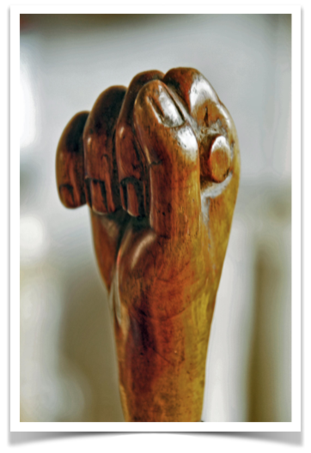How do you describe a hand? Not with mere words. It is a thing, yet much more. It comforts or hurts, it builds and destroys, it soothes and feeds, and steals and sews, and sometimes it rests there, slightly curled, as if in its own fetal position.
It has strange faculties. Each of its digits can move independently, and yet they are joined. A prehensile thumb makes grasping possible, like the claw of a bird grasping its perch. It has knuckles, hard joints where bone, sinew and cartilage meet. And it has nails, hardened cells that are used for finer, more precise actions than the blunt fingers can manage. Nails have no feelings in themselves, but excruciating pain lies beneath them. The hand has strong sensory abilities, feeling the slightest glass sliver, fine hair, heat and cold, and can discern objects by sensation alone. Yet, these words hardly describe a hand.
In truth, a hand is so much more. It is breath to movement. A chord to music, the color blue against green.
I remember long elegant fingers. They belonged to a young, unusually tall Chinese fellow.

His parents owned a neighborhood restaurant, situated in a tiny corner next to the theater. It was a lovely restaurant, with eight small tables and a counter for three. There were plants everywhere, and white, crisp tablecloths. The place was clean and smelled delicious as soon as one entered. The family worked together: mother, father and a son, who appeared to be about seventeen or eighteen. He spoke the best English of them all, and patrons had no difficulty understanding the gestures, smiles, bowing and kindness in all their eyes.
The young man had chiseled features: a broad brow, high cheekbones, straight nose and soft mouth that had a gentle smile. He was a sweet young man, kind and very gracious. It was clear that he would go places. Perhaps he would work in his parent’s restaurant while he studied law or medicine.
I remember his hands best because his fingers were so long and graceful. He reminded me of a dancer as he moved. He placed the dishes on the table as if he placed a great piece of art, a sculptured marble figure, a cut ruby before a king. It was an elaborate ritual full of symbolic gestures—far too subtle to observe, yet meaningful beyond the mere necessity of delivering a plate.
I know what it’s like to work in a restaurant. I know what it is to interpret for your parents and to hear them butcher the English language. But I do not know how difficult it must have been for this family to come to America, a land so very foreign, a language so hard to pronounce. I only imagine what it must be like when I think that I am one of the lucky ones, whose parents crossed the river or the sea to start a new life in a new land. I wonder how I would fare finding myself in China, not knowing the way of the land, the language, how to read, how to find food, a job, a place to sleep, knowing that I stand out because I look different, smell different, sound different. Such courage it took for our ancestors.
And so, it took courage for our small Chinese family to come to America, and to start a little restaurant and to offer their gifts to strangers. Yet they knew they would make it. I could see pride sparkle in their eyes when the parents gazed at their son. The family was very close. Their bond was expressed in the smiles and soft words they exchanged, the respect with which they moved. The son clearly loved his parents. At closing time, he would take the broom from his mother’s hands and sweep the floor. He would help his father lift heavy pots, and move furniture. He was their hope for a gentle future.
One night, when the restaurant was full, a couple of masked, armed men rushed in and ordered the young man to clear out the cash register. He was scared. He fumbled, trying to get the cash register open and to shield his mother from the gun. In their impatience, the robbers shot him in the head and fled without any money. He died at his mother’s feet, amid stunned patrons, and a father sobbing across his son’s chest.
I wonder if remembering him brings him back to this plane. Can he know that decades later, I still remember him and his family, his beautiful eyes, his rare sweetness, and that these strangers live still in my heart? Do they remain with me because their journey was abruptly halted, because of the senselessness, the waste, the way this story ended?
The why does not matter. What matters is that these people left me with a precious gift, something I carry with me. I am thankful that the parents shared the life of this wonderful young man with me—a complete stranger.